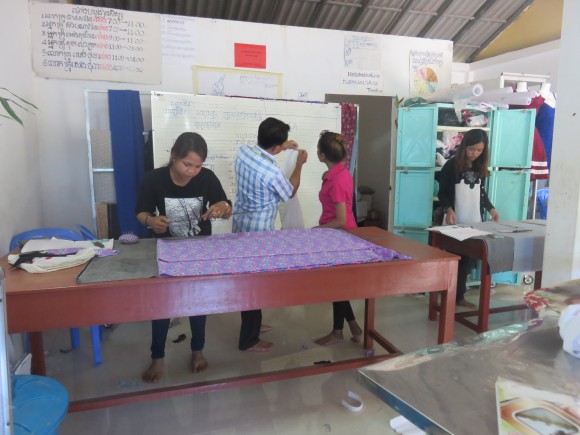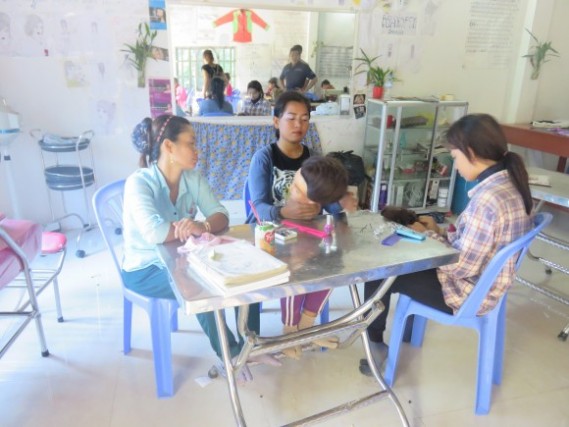Supporting marginalised youth in Prey Veng Province

Jessica joined the ACTED Cambodia team as part of the EU Aid Volunteers initiative, working in the field of communication. She tells about her first field visit after arriving in the country.
Since April 2016, 679 vulnerable youth from the poor Cambodian Prey Veng province have been enrolled in vocational training courses across ACTED’s 4 pilot Community Learning Centres (CLCs).
Aside from providing teaching materials and suitable training courses, these learning centres target school dropout students a chance to learn important skills to obtain meaningful employment and break the cycle of youth marginalisation. ACTED also provides teaching materials for teachers and budget training for the management and supporting committees.
Currently the pilot CLCs offer courses on Sewing, Motorbike Repair and Beauty Salon with hopes of establishing Khmer Traditional Music Classes in the future. These CLCs also offer young children functional literacy training.
Leaving the paved roads of the city behind and journeying out onto the rocky dirt roads, we drove towards the Community Learning Centres in the remote communes of Prey Veng. The shops and bustle of city life fade away, as the vibrant green rice fields and palm trees stretch out across the vast countryside. The roads are rough going with deep potholes, and are liable to flooding in the rainy season, often isolating rural areas from the cities.
Far into the rural countryside, past all the flooded rice fields and stacked up Khmer style houses lay the communes. The reality of rural life for young people is apparent, and the reason why so many young people dropout of school to move to the city of Phnom Penh and neighbouring Kandal province to find work becomes obvious. Young boys and girls were either sheltering under their houses from the heat or clustered around each other. The opportunities for youth to grow past rudimentary farming were almost absent, with only a few shops dotted about through the countryside. It’s not hard to see why only 46.2% of young people attend secondary school in Prey Veng.
At the end of a dusty path, passing a bright Pagoda along the way, lays one of the four CLCs. Cows lie idly in the shade chewing on grass. The whirring sewing machines and the chatter of students can be heard from the open doors. Inside, the early sun streams in and students from both the sewing and beauty salon training are in the middle of class.
Among the students is Len, a 22 year-old from Pocarey Village. Her head is buried in the pattern she’s mapping out, the teacher on hand advising her work. She has already graduated from the beauty salon class, and is due to finish the sewing class soon. Len shares her future plans enthusiastically: “I want to start up my own business from home, but the opportunity wasn’t there before.”
The courses offered at the CLCs are free, and are shortened to 4 months instead of the 6 month courses offered at the government run CLCs. “I feel more independent to run my own business without having to rely on parents or husbands for financial support,” Len said, beaming proudly.

The beauty salon class runs alongside the sewing classes. Taeou, a 19 year-old from Prey Kla village, is among them. She’s working intently on a mannequin head, learning how to braid hair into different designs. “It’s empowering being able to share the experience with students and trainers, and being able to learn from each other”, Wicheka explains.
As there is a high percentage of high school drop outs in Prey Veng, Wicheka and Len would especially recommend these trainings to their friends in future. “For dropouts from school, I would definitely recommend the vocational training courses as they offer skills to run a business and sustain a life for the future,” said Wicheka.
Lining the walls of all the classrooms are the beautiful garments the students have created, each perfectly crafted. Unlike the government owned CLCs, ACTED’s pilot centres incorporate social enterprise into the model. The clothes the students make will be sold, and the money will go back into the CLCs to buy more raw materials. ACTED provides training to the management and supporting committees on how to create a successful social enterprise. Whilst boosting the students confidence, this model means the CLCs can become self-sufficient; a key aspect of the pilot CLCs.
Leaving the rural communes, it’s exciting to see students so motivated to put their newly learnt skills to work and empower other young people to do the same.